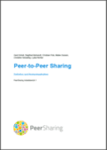Peer-to-Peer Sharing
Abstract
Everyone is talking about the sharing economy at the moment - but there are hardly any scientifically validated findings about its actual development and its economic, social and ecological impacts. The project "PeerSharing", funded by the Federal Ministry of Education and Research (BMBF), therefore pursues the goal of concretising and empirically substantiating the socio-ecological effects and potentials of peer-to-peer sharing in selected areas. The research question is: How sustainable is internet-based peer-to-peer sharing? It will be investigated, among other things, using the example of practical partners in real laboratories. The partners are online platforms from the areas of mobility (Drivy, flinc), accommodation (Wimdu) and clothing (Kleiderkreisel). The first work package served the conceptual recording and practical stocktaking of peer-to-peer sharing. Peer-to-peer sharing is defined as the use of material goods shared between private individuals and mediated by third parties (online). Sharing takes place either between different users without transfer of ownership in the sense of intensification of use (co-using, lending, renting) or with transfer of ownership in the sense of extension of use (giving away, swapping, reselling). For the inventory, the online platforms available in Germany at the time of May 2015 were recorded in a database and evaluated with regard to selected characteristics (e.g. consumption sector, year of foundation, community or environmental orientation, intention to make a profit). The inventory was supplemented by short case studies on the business models of the project's practice partners. The inventory shows that internet-based peer-to-peer sharing is developing dynamically in Germany and includes diverse concepts and offers from different areas of consumption. The opportunities and risks that this development poses for sustainable business will be examined in more detail in the following steps of the projectThe sharing economy is currently on everyone's lips - but there are hardly any scientifically validated findings about its actual development and its economic, social and ecological effects. The project "PeerSharing", funded by the German Federal Ministry of Education and Research (BMBF), therefore aims to concretise and empirically substantiate the socio-ecological effects and potentials of peer-to-peer sharing in selected areas. The research question is: How sustainable is internet-based peer-to-peer sharing? It will be investigated, among other things, using the example of practical partners in real laboratories. The partners are online platforms from the areas of mobility (Drivy, flinc), accommodation (Wimdu) and clothing (Kleiderkreisel). The first work package served the conceptual recording and practical stocktaking of peer-to-peer sharing. Peer-to-peer sharing is defined as the use of material goods shared between private individuals and mediated by third parties (online). Sharing takes place either between different users without transfer of ownership in the sense of intensification of use (co-using, lending, renting) or with transfer of ownership in the sense of extension of use (giving away, swapping, reselling). For the inventory, the online platforms available in Germany at the time of May 2015 were recorded in a database and evaluated with regard to selected characteristics (e.g. consumption sector, year of foundation, community or environmental orientation, intention to make a profit). The inventory was supplemented by short case studies on the business models of the project's practice partners. The inventory shows that internet-based peer-to-peer sharing is developing dynamically in Germany and includes diverse concepts and offers from different areas of consumption. The opportunities and risks that this development holds for sustainable business will be examined in more detail in the following work steps of the project.
